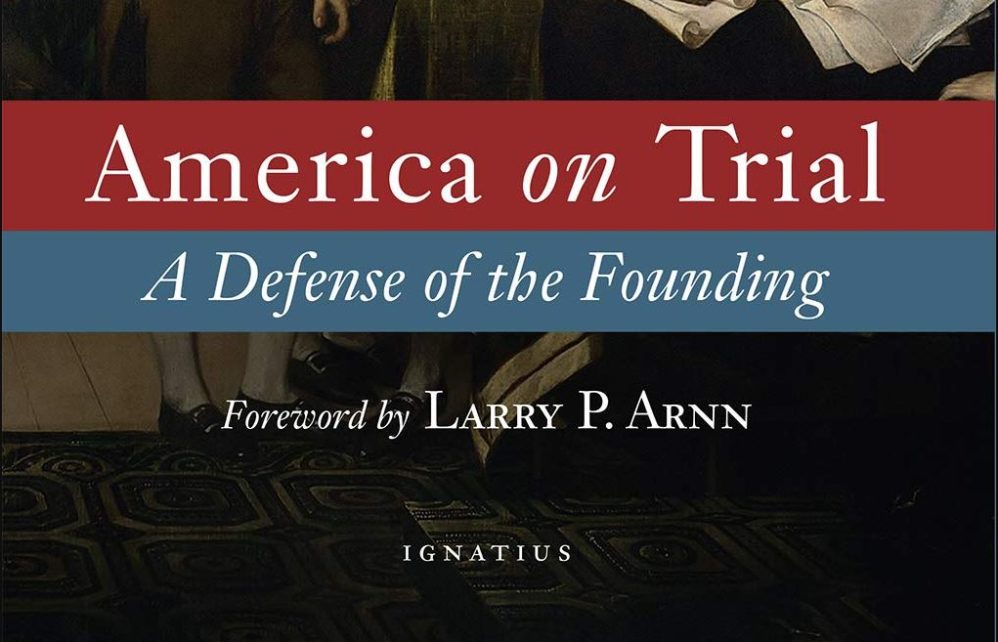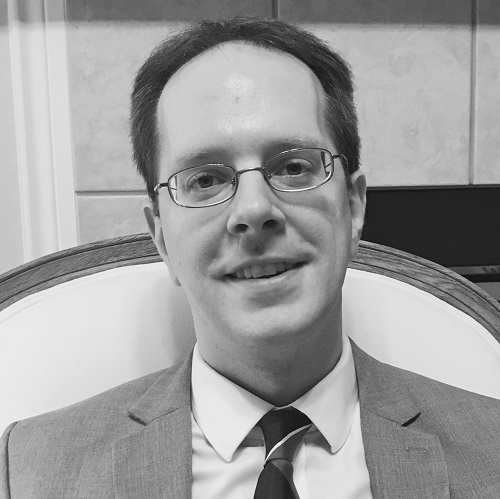Rebutting Attacks On America’s Founding Principles From The Left And The Right
In America on Trial: A Defense of the Founding, author Robert Reilly makes the same mistake as many other conservative scholars: In his desire to win the argument, he sacrifices his audience.
He obviously intends to set the record straight about the American founding and address increasingly popular misunderstandings from both the progressive left and the traditionalist right that either see it as a power grab of white landowners or the beginnings of an amoral, relativistic modernist society. Reilly stakes his claim the American founding was a continuation of the constitutionalist, natural law tradition of which all Americans can be proud.
Unfortunately, even an educated reader will struggle to keep up with the many block quotes, footnotes, and philosophical concepts that make 330 pages seem like 1,000. This is a shame, because Reilly’s argument is an important one.
He correctly frames the meaning of America and its ideals, offers a response to those who have come to doubt those ideals, and even offers remedies for some of the problems plaguing modern society. Unlike his detractors who have tried to fight these battles in the public square, Reilly supplies the necessary evidence to win those battles convincingly.
Reilly starts his case by examining the foundations of American classical liberalism—all the way back to Athens, Jerusalem, and Rome. He centers on the “three cultures without which it might never have occurred to man that he is out to rule himself according to reason, rather than simply be subject to force and accident—as was the case throughout most of recorded history.”
In Athens, the philosophers established the key concepts of objective truth and the intelligibility of nature; in Jerusalem, the revelations of the Hebrew prophets established the dignity and equality of all human beings who were made in the image of God; and in Rome, Christians established the principles of freedom and reason through the mystery of the Incarnation.
Nominalism Versus Absolutism
This first section of the book is perhaps the most enjoyable, since it resembles Ben Shapiro’s ode to Western civilization in The Right Side of History—a great companion piece to America on Trial. These concepts rooted in the ancient world are the most familiar to readers because they are the oldest and most universal. Reilly adds interest to this section by contrasting these fundamental ideas with the pantheistic, fatalistic, hierarchical, and superstitious cultures that normally predominated in ancient civilization.
It is when Reilly moves into the Medieval era that his argument becomes somewhat harder to follow—not because it’s wrong, but because it becomes much more complicated and abstract. During this period, political philosophers attempted to settle ongoing conflicts between church and state. Reilly argues that resolving this conflict ultimately “created the conditions for the development of the principles of equality, the rule of law, popular sovereignty, the requirement for consent, the right to resist tyranny, and the grounds for representation in ecclesiastical and then secular government.”
If a government is secular and only has authority over temporal matters, then its authority is not absolute and it must be accepted by the community. If the church is not absolute and only has authority over spiritual matters, it cannot involve itself in politics nor should it try to use the government to impose its agenda.
Through this process, a certain “constitutional thinking” emerges in Christendom that differentiates between divine law, natural law, and human law. This is significant because it essentially rationalizes authority and creates criteria for an objectively moral legal system that recognizes the rights of individuals and communities.
As Reilly points out, it was at this time, not the later Enlightenment, that ideas like ruling with the consent of the governed, equality under the law, and limited principles on government came into being. Therefore, he considers the American Revolution something of a misnomer since it really was “a reestablishment of [constitutional] principles and practices,” instead of a break with precedent.
Since this is the case, what should one make of the absolutism that characterized European nations after the breakup of Christendom in the late Middle Ages? One word (albeit a very loaded one): nominalism. As Reilly explains, “Nominalism holds that natures or essences do not exist in reality but are only ‘names’ or contrivances inhabiting the mind, with no correlation to what exists outside of it.”
Put another way, nominalism asserts that objective reality can’t be known, and that we just agree to assign names and values to things in the world. This means that fundamental concepts like reason, truth, or even morality are all relative depending on the individual.
As Reilly shows, the rise of nominalism (which opposed the essentialism of Aristotle and St. Thomas Aquinas) has massive implications for government. Throughout the middle-third (chapters 3-7) of the book, he draws a straight line from nominalist philosopher William of Ockham to Martin Luther to Thomas Hobbes and then to King James I of England. What began as a theological matter as to whether nature operated according to God’s Mind or God’s Will eventually morphed into whether a government had to follow prescribed rules (right makes might; natural law) or make the rules itself (might makes right; absolutism).
Fortunately, some opposed nominalism and absolutism during these centuries, arguing for natural law and a constitutional system. In particular, Reilly mentions Richard Hooker, Roberto Bellarmine, Francisco Suarez, and Algernon Sidney. He generously quotes each of these important figures and demonstrates the clear influence they had on the American founding fathers as well as the main philosopher associated with American independence, John Locke.
While Reilly is meticulous in heaping quote upon quote from each of these thinkers, it makes these chapters almost as unbearably tedious and dry as a doctoral dissertation. Either he bit off more than he could chew trying to summarize so many centuries of political philosophy in a hundred pages, or he forgets his audience and simply lists his research to prove opponents like Patrick Deneen wrong. Either way, the reader is left to parse difficult passages without much explanation or context from Reilly, making this section a slog.
Fortunately, the argument picks up as soon as Reilly discusses Locke and the founding. Having presented his terms and premises, he can now apply them to a few important questions. In the case of Locke, he attempts to correct the misconception that he was “Hobbes with a smiley face,” or a kind of nominalist who broke with the natural law tradition and endorsed a purely empirical approach to politics. Reilly explains that although Locke’s approach to politics and other subjects seemed to eschew Aristotle’s formal and final causes in favor of focusing on material and efficient causes, he more often espouses the same constitutional views as Hooker, Bellarmine, and Suarez than he does with Hobbes.
In any case, the American founders seem to interpret Locke with the lens of natural law rather than an absolutist, technocratic lens. Hence, documents like the Declaration of Independence and the U.S. Constitution seek to maximize freedom and promote virtue while pushing back against the tyrannical encroachments of England.
Reilly contrasts this with the French Revolution, which really did dispense with natural law and result in the creation of an anti-religious leviathan state. After reviewing the actions taken during the French Revolution and the accompanying testimony of intellectuals at the time, Reilly concludes that “the differences can be defined by the primacy of reason in the one and primacy of will in the other, which led the American revolutionaries on the whole reasonably and the French revolutionaries to behave on the whole unreasonably.”
More Questions Than Answers
After tracing the philosophical developments that led from the ancient world to the end of the Enlightenment, Reilly concludes his book by addressing various objections from Deneen (author of the much-discussed Why Liberalism Failed) and Michael Hanby, who assert that the American founding “is at fault for today’s deleterious developments.” It would have been helpful here to describe what exactly are “today’s deleterious developments,” especially to those who might not be familiar with Deneen’s criticisms. The reader must therefore infer these developments include radical individualism, moral relativism, and the dissolving of community—a kind of libertarian dystopia.
As he does throughout this book, Reilly goes straight to the primary sources to respond to this argument. Even though he makes a strong case that the founders presumed a virtuous and religious society and sought to use freedom as a means of achieving those ends, he fails to adequately explain what then led to America’s current problems. At the very end, he suggests that America has been gradually adopting a Hobbesian understanding of a government of unlimited power: “We are now enduring such a transformation of the United States, where political rule is becoming increasingly arbitrary.”
Although this is an interesting point, it seems to conflict with Reilly’s whole argument. How does the rise of absolutism lead to relativism? How does a leviathan state lead to radical individualism? How does expanding the meaning of natural rights lead to a departure from natural rights altogether?
If the answer to this problem is a better understanding of the American founding and a continuation of its principles, how does society implement this? Is it really just a matter of changing curriculum in American history classes, as he mentions? None of this is to say that Reilly undermines his argument altogether; he just leaves the reader with questions that should have been answered throughout the book.
Overall, this failure to answer such questions is the biggest problem of Reilly’s often brilliant book. Unless a reader is steeped in the literature and language of pre-Enlightenment political philosophy, he will struggle to know why all this matters. Reilly could have addressed current events affecting Americans, like the Deep State, historical revisionism along the lines of the 1619 Project, or even controversies such as Drag Queen Story Hour. Instead, he prefers to keep his subject academic and mostly settle his scores with other intellectuals.
It therefore falls on readers to know where to apply these ideas, particularly now when democracy, morality, and objective truth seem at stake. This will be a challenge, but it will ultimately be worthwhile—much like reading America on Trial.



No comments:
Post a Comment